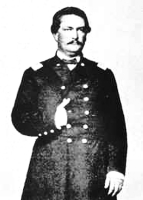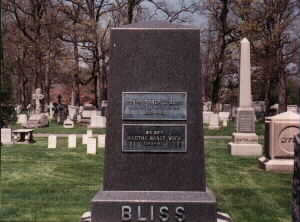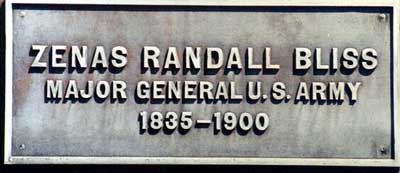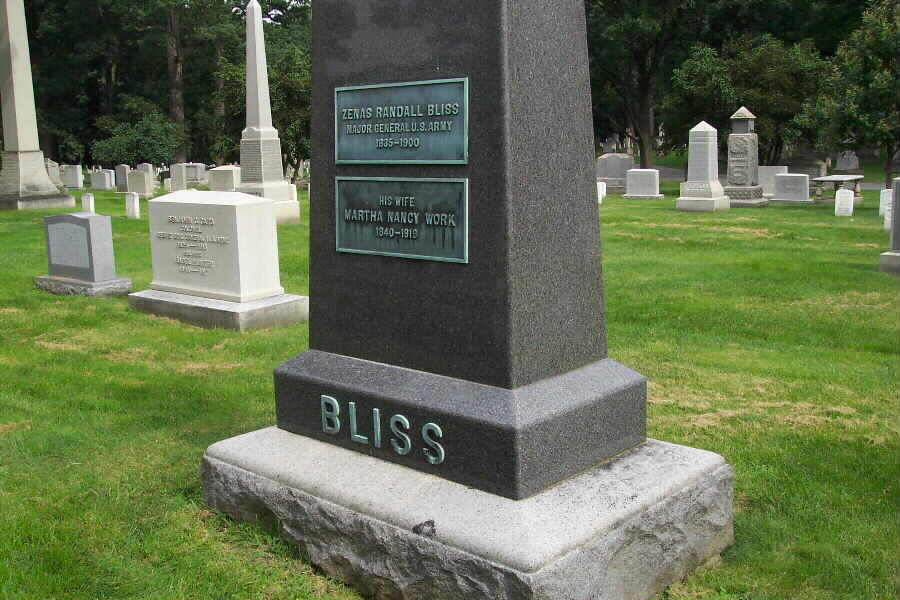Born at Johnston, Rhode Island, on April 17, 1835, he was appointed a cadet at West Point in 1850 and graduated in the class of 1854.
He was breveted Second Lieutenant, 1854; Second Lieutenant, 1855; First Lieutenant, 1860; Captain, 1861; Major, Infantry, August 6, 1867; transferred to the 25th Infantry, 1869; Lieutenant Colonel, 1879; Colonel, 1886; Brigadier General, 1895. In command of the Department of Texas, 1895-97; Major General, May 14, 1897; and retired at his own request after more than 40 years of service, May 22, 1897.
He married Martha N. Work, October 21, 1863.
He served in Texas until May 9, 1861, when he was captured with the command of Colonel I.V.D. Reeve, 8th U.S. Infantry, by a Confederate force under General Earl Van Dorn, and he was held as a prisoner-of-war, at San Antonio, Texas, and Richmond, Virginia, until he was exchanged on April 5, 1862. He was appointed Colonel, 10th Rhode Island Volunteers, August 1862; fought in the Fredericksburg campaign, December 1862; then in the Division of the Ohio in Kentucky to May 1863; transferred with the 2nd Division IX Corps, and with that organization took part in the siege and capture of Jackson, Mississippi.
He transferred to Kentucky and commanded the military district of Middle Tennessee to the Spring of 1864; commanded the 1st Brigade, 2nd Division, IX Corps, in the Wilderness Campaign and in the battles of the Wilderness, Spotsylvania, Petersburg, etc. After the war, he commanded the military district of Charleston, South Carolina, and was Assistant Commander of Freedmen and Abandoned Mines and various branches of military and civil duty.
He was awarded the Medal of Honor on December 30, 1898, for services during the Civil War at Fredericksburg, Virginia, on December 13, 1862, while serving as Colonel, 7th Rhode Island Volunteer Infantry.
He died on January 2, 1900 and was buried in Section 1 of Arlington National Cemetery. His wife, Martha Nancy Work Bliss (1840-1919) is buried with him.
Colonel Zenas Randall Bliss, son of Zenas and Phoebe Waterman Randall Bliss, was born in Johnston, Rhode Island, April 17th, 1835. His early education was obtained chiefly at the University Grammar School in Providence, Rhode Island, then conducted by Messrs. Frieze and Lyon.
He was appointed a cadet at West Point, July 1, 1850, and was graduated from there four years later with the rank of Brevet Second Lieutenant. His first duty was to conduct a body of recruits to Texas. There he was attached to the garrison of Fort Duncan for the space of two years. May 4, 1855, he received a commission as Second Lieutenant in the Eighth Regiment of Infantry.
During the Summer of 1856 he did considerable scouting. He was stationed at Fort Davis from 1856 to 1858, at Fort Mason in 1858 and 1859, at Fort Inge and at Fort Clark in 1859, and at Camp Hudson in 1859 and 1860. In 1860 he conducted recruits to Fort Lancaster where he was in command for a short time, when he was transferred to Fort Quitman, where nearly a year passed. Here he was the only commissioned officer present, not even a doctor being allowed him. Neither did he have any one to converse with save his enlisted men. So numerous and so aggressive were the Indians they often fired their arrows at the sentinels on post at the barracks and the corral. The night he arrived there while walking out with the officer he relieved, they met two braves crossing the parade ground.
On October 17, 1860, he was promoted to be a First Lieutenant in the Eighth Infantry. Up to this time being one of the junior officers and unmarried, he was almost constantly on the warpath, but from the time he went to Fort Lancaster, until he was placed on the retired list with the exception of a very few months, he was entrusted with an independent command. Upon the alleged secession of Texas, General Twiggs turned over all goverment property within its borders to that body politic. Lieutenant Bliss was ordered to take only such commissary stores as were necessary to supply the wants of his men until he should reach San Antonio, 650 miles distant, and ammunition sufficient to protest themselves from the savages. As they seldom attacked so large a force, ten rounds seemed an ample supply. As nothing had been said about destroying the remainder, he carefully secured and locked all the buildings and started on his march towards civilization. He had proceeded on his way some two days, when he received an order directing him to return and wait the arrival of other troups coming in from the west. Once again at his post he found everything as it had been left. Though the tracks of the Indians were all around, they feared to touch aught lest they should fall into some trap. At length Colonel Reeve appeared with the garrisons he had gathered up, which gave him a total force of some 450 men. The march coastwise was now resumed. The colonel had thought to make a forced march when within striking distance of San Antonio, seize its arsenal by night, and thus make himself master of the situation, but fifteen miles out he met a regiment of cavalry, a regiment of infantry, a battery of six pieces of artillery and an independent company of 100 men, all sharpshooters. Its commander ordered Colonel Reeve to surrender. He replied that of course he could not think of yeilding to any mere show of force, but if he could be permitted to satisfy himself that they were in a position to enforce the demand he would submit. The privilege was accorded and Lieutenant Bliss was sent to inspect the insurgent force. He found the artillery chests filled with a proper assortment of ammunition in excellent condition, the catridge boxes of both infantry, cavalry and riflemen loaded to their utmost capacity, arms of all kinds in perfect order and the appearance and conversation of the men indicative of business. He found in the ranks one gentleman with whom he had frequently gone hunting, and whom he always had found to be an unerring shot. The two agreed that if there should be a fight they would not fire at each other. When the Lieutenant returned and reported to his superior, he was at once convinced it would be sheerest folly to undertake with next to no ammunition to combat a force four times as large and fully equipped, therefore he capitulated. This was early in May, 1861.
Lieutenant Bliss was made Captain in the Eighth Infantry, May 14, 1861, though he remained a prisoner of war in San Antonio until early in February, 1862. Such bitterness of feeling existed in that city, the officers were allowed to retain their side arms and wear their revolvers to protect themselves from bodily harm. For a long time a personal friend kept a swift horse, bridle, and saddle, where he could put his hands on it at any time that he might escape if he could, should emergency arise. They were finally sent to Richmond, California, where they were quartered in the negro jail.
In April 5, 1862, Captain Bliss was exchanged, and May 26th was commissioned Colonel of the Tenth Regiment Rhode Island Volunteers, with which he served in the defenses of Washington, until August 6th. He was then transferred to the command of theSeventh Rhode Island. On the march from Pleasant Valley, Maryland, to Falmouth, Virginia, he was engged in a skirmish near White Sulphur Springs. Participating in the Rappahannock Campaign, December, 1862, to March, 1863, he was engaged in the battle of Fredericksburg. He was at once recommeded for promotion to brigadier-general of volunteers by all his superiors, for ‘gallantry and skillful handling of his regiment under fire’. Although this was not complied with, he was brevetted major in the regular army for gallant and meritorious service on that field, and received a Congressional Medal of Honor for most distinguished gallantry. He accompanied the Ninth corps to Kentucky in March, 1863, and to Visksburg in the ensuing June and July as well as to Jackson, Mississippi, which was reoccupied on the 17th of the latter month. Here he was again recommended, the first in the corps, for promotion in the rank of brigadier-general of volunteers, and the recommendation was approved and his immediate appointment asked for by U. S. Grant.
After the return of the Ninth Corps to the Department of the Ohio, August, 1863, he was in command of Lexington, Kentucky, from October to December, and of the District of Middle Tennessee from January to March, 1864, when he was for a third time recommended for promtion to the rank of brigadier-general of volunteers by all his supporters, but with no more result than upon previous occasions. It was subsequently ascertained that some wiseacres in Washington had decided that no promotion should be given any officer who surrendered, just as if a subaltern was in any sense responsible for the acts of his regimental commander. Only another illustration of that unreason so often exhibited by those from whom the sovereign people has a right to expect better things. Be it noted, however, he was entrusted with all the responsibilities and enjoyed all the authority pertaining to the position which he had fairly earned, though for the discharge thereof he was reimbursed merely according to the rank actually held.
Returning with the Ninth Corps to Virginia in March, 1864, he was placed in charge of the depot of supplies at Alexandria during the month of April. When the final movement towards Richmond was inaugurated he was assigned to the charge of the First Brigade, Second Division, Ninth Corps, and thus engaged in the battle of the Wilderness, May 5-6th. Because of the gallant and meritorious services there rendered, he was made brevet Lieutenant Colonel in the regular army to date from May 7th. He was injured at the Spottsylvania battles May 9-12th, which necessitated absence on sick leave May 13th to July 1st. During July and August he was in command of the same brigade, and thus participated in the Mine assault July 30th.
From August to October he was again absent on sick leave. When able to discharge its duties he was detailed as president of a board of examination, with which he was connected until June, 1865. On the 28th day of that month he was mustered out of his volunteer rank, and, of course, fell back to the inferior dignity, responsibilities and emoluments of an infantry Captain.
From July 13, 1865, to March 2, 1866, he was engaged in recruiting service. He was in command of a company during most of March at Baltimore, Maryland, most of April at Skuylkill Arsenal, Pennsylvania, and most of May at Fort Porter, New York. From June 7th to August 13th he had charge of the District of Chester South Carolina, and was Assistant Commissioner of the Bureau of Refugees, Freedmen and Abandoned Lands. In recognition of the fact that he served longer in the field during the War of the Rebellion than any other officer of his regiment, he was again detached on reruiting service from September 6th for one year. On August 6th, 1867, he was promoted to Major of the Thirty-ninth Infantry and placed in command of Forts Jackson and St. Philip, Louisiana, from February 4, 1868, to February, 1869. On March 15, 1869, he was transferred to the Twenty-fifth Infantry, but was in charge of Ship Island, Mississippi, from February to April of that year, of Jackson Barracks, Louisiana, during the month of April, of Ship Island again until August, of Jackson Barracks a second time until December, and of Ship Island for a third and last time to April, 1870. From there he went a second time to Forts Jackson and St. Philip, where he remained until July.
Frontier duty was resumed after a nearly ten years’ respite on the 5th of that month at Fort Duncan, Texas, where he remained in command until April 5, 1872. Fort Stockton required his supervision May 20 to March 17, 1873, and Fort Davis with its regimental grrison March 21, 1873, to April 13, 1874. From there he took a batch of prisoners to Austin which occupied his time until May 12th, when he received a leave of absence which he enjoyed until March 24, 11875. His next duty was the command of Fort Bliss, april 5, 1875, to April 4, 1876, followed by that of Fort Davis April 14th to December 1st of the same year; Fort Bliss again from the 13th to January, 1877, and Fort Davis once more to April 2, 1877. Next he was to be found member of Board of Examination of Horses at San Antonio until July, whence he was returned to frontier duty at Fort Clark until February 28, 1878. All the above posts are situated in Texas.
After a seven months’ vacation, October 2d he was placed over David’s Island Depot, New York, where he remained until October 6, 1880, being promoted meanwhile (March 4, 1879) to Lieutenant Colonel of the Nineteenth Infantry. Thence he was transferred to the command of Fort Hays, Kansas, which he retained until October 30, 1881. Thence he was ordered to Fort Ringgold, Texas, where he was obliged to ask for sick leave March 8, 1882. Not until November 7th, was he able to resume the responsibilities of his rank when he was placed in charge of Fort Duncan, Texas.
Next from August 31, 1883, to June 3, 1886, he was in charge of Fort Clarke, Texas, save during a leave of absence extending from April 11 to November 22, 1885. Having been commissioned Colonel of the Twenty-fourth Infantry April, 1886, as soon as relieved he repaired to Fort Supply, Indian Territory (Oklahoma), and commanded that post as well as his regiment until September 16, 1877, when he was obliged to avail himself to another sick leave for six months.
On March 24, 1888, he resumed command of his regiment at Fort Bayard, New Mexico, and continued therein until his appointment as Brigadier General, United States Army, April 25, 1895, when he was entrusted with the Department of Texas. On May 14, 1897, he was promoted to the rank of Major General, but eight days thereafter at his own request having rendered service fully forty-seven years, he was placed upon the retired list and established his home at Washington, D.C. It was there he died January 1, 1900. His remains were interred at the Arlington National Military Cemetery.
He held membership in the Military Order of the Loyal Legion, in the Society of Indian Wars, in the Society of the Army of the Potomac, and in the Society of the Ninth Army Corps.
Colonel Bliss married October 22, 1863, Martha Nancy, daughter of Godfrey and Almira Thomas Work, of Providence, Rhode Island, who survives him with two children, Alice Ingoldsby Bliss, residing with her mother at the national capital, and Zenas Work Bliss, a resident of Cranston, Rhode Island.
Colonel Bliss enjoyed the entire confidence of the rank and file of the Seventh Regiment, and of the Tenth as well, because his justice, watch care, and professional skill were evident to all.
BLISS, ZENAS R.
Rank and organization: Colonel, 7th Rhode Island Infantry. Place and date: At Fredericksburg, Virginia, 13 December 1862. Entered service at: Johnston, Maine. Birth: Johnston, Maine. Date of issue: 30 December 1898.
Citation: This officer, to encourage his regimen; which had never before been in action, and which had been ordered to lie down to protect itself from the enemy’s fire, arose to his feet, advanced in front of the line, and himself fired several shots at the enemy at short range, being fully exposed to their fire at the time.

Union officer leads a suicide attack
8 October 2005
Colonel Zenas Randall Bliss of Rhode Island received the medal of honor for his actions at Fredericksburg in 1862.
By Mac Wyckoff
Zenas Randall Bliss was born on April 17, 1835, in Johnston, Rhode Island. Bliss was appointed to West Point in 1850 nd graduated four years later with the rank of brevet second lieutenant. He was sent to western Texas, where he served until the start of the Civil War with the 8th Infantry. American Indians were numerous and aggressive on the Texas frontier.
When Texas seceded, the 8th Infantry was stationed, ironically, at Fort Bliss, near El Paso, named for another officer named Bliss. The 8th Infantry was ordered to leave Texas, taking only the minimum supplies necessary to complete the journey.
Lieutenant Colonel Isaac Reeve, commanding the 8th Infantry, decided to make a forced march 650 miles to San Antonio, seize the arsenal, and win back control of Texas for the Union. However, 15 miles from their destination, they were met by a superior force and surrendered in early May 1861.
This was a turning point in Bliss’ life that would lead to his imprisonment and later stymie his professional advancement.
Bliss was promoted to Captain while a prisoner in San Antonio. The locals exhibited such hatred toward the U.S. troops that Bliss and the officers were allowed to keep their side arms for their protection. He remained there until early February 1862, when he was sent to Richmond. On April 5, 1862, Bliss was exchanged for a Confederate naval officer.
Bliss returned home and on May 26 was commissioned colonel of the 10th Rhode Island, which served in the defenses of Washington. On Aug. 6, 1862, he was transferred to command the 7th Rhode Island in the IX Corps under Gen. Ambrose Burnside.
After some minor skirmishing, their first serious combat came at Fredericksburg. After crossing the Rappahannock River on December 12 and spending at unpleasant night in the city on Caroline Street, the 7th Rhode Island was up early on December 13. For some time, they watched the wounded streaming to the rear and wondered whether they soon would be among the casualties. Their question was soon answered.
A cannon shot landed on a roof near Bliss. He witnessed a Private reach out to catch the projectile as it fell off the roof, badly lacerating the young man’s hand. He was the unit’s first battle casualty. Much worse was soon to occur.
About 2:30 p.m., the 2,000 men of their brigade began the horrifying advance through the alleys and yards of Fredericksburg south of the RF&P Railroad. The tracks soon split the brigade, with Bliss’ unit and the 6th New Hampshire crossing to the north side. The 7th Rhode Island and 6th New Hampshire continued their advance, while the other three regiments lagged behind.
The New Hampshire unit led the 7th Rhode Island across the open plain devoid of cover under increasingly heavy fire, especially from the Washington Artillery.
A shell struck the lieutenant colonel of the 7th Rhode Island in the stomach, sprinkling Bliss from head to foot with blood and pieces of lung. The color guard was shot to pieces and the flag was hit by 16 bullets and one artillery shell. A bullet grazed Bliss and killed the man standing behind him. They lay down, seeking the slight cover provided by a swale that still exits along the west side of what is now Littlepage Street.
Suddenly, Bliss jumped up and ordered his men forward toward what is now the National Park Service bus parking lot along Lafayette Boulevard.
Bliss managed to get off several shots before his unit was nearly destroyed by “a perfect volcano of flame” from behind the stone wall and the artillery on the heights. One survivor remembered it as “one of the most merciless slaughters of the entire War.” Another Federal thought it looked like “barrels of blood” had been poured on the ground.
The Rhode Islanders fell back to the relative safety of the swale, and under cover of darkness returned to the city. The regiment lost 158, by far the most in the brigade.
Bliss’ decision to attack with a few hundred against thousands of well-positioned Confederates was suicidal. Yet, there is a fine line between suicide and gallantry. Bliss was recommended for promotion to brigadier general by all his superiors, but the promotion was denied. In 1898, Bliss received the Medal of Honor for his actions at Fredericksburg.
After Fredericksburg, Burnside returned to command his beloved IX Corps as they tromped around the South; Suffolk on the Virginia coast, Tennessee, Kentucky and Mississippi before being recalled to Central Virginia in the spring of 1864. Despite seeing little combat, Bliss was twice recommended for promotion, and twice it was denied. It was later learned that someone in Washington had blocked Bliss’ promotion on the grounds that someone who had been surrendered should not hold the rank of Brigadier General.
At the Wilderness on May 6, Bliss was complimented for his leadership. The armies moved on to Spotsylvania. Bliss’ unit arrived on the field west of the Fredericksburg Road, now State Route 208, and north of the Ni River late on the night of May 10. Bliss lay down among what he thought were sleeping soldiers. He awoke the next morning to find a field of dead.
“Their appearance was horrible,” he remembered. “Their faces were terribly drawn up as though they had died in great agony.”
Late in the afternoon, Bliss’ brigade advanced south of the Ni. His horse slipped trying to jump across the stream. Bliss was thrown from the horse, which fell on his ankle, causing excruciating pain. No bones were broken, but a doctor confined Bliss to bed.
Bliss woke early on May 12 to the sound of battle. He angrily criticized his staff for not waking him sooner. They assured him that they had let him sleep as he was too badly injured to participate in the battle. He painfully mounted a horse and rode toward the front, but quickly realized that “I was in such pain by that time that I was willing to remain in the field hospital.” He went on medical leave the next day, where he remained until July 1.
In the aftermath of the Federal disaster at the Crater at Petersburg on July 29, Bliss was one of five IX Corps officers whose role in the fiasco was investigated by a court of inquiry. In the end, the others were found most responsible for the disaster, but Bliss was censured for remaining behind while most of his brigade advanced. Possibly he had learned something at Fredericksburg about making suicidal attacks.
He again went on sick leave and finished the war in a desk job. After the war he served around New Orleans where he met a member of the Washington Artillery whose guns had nearly destroyed Bliss’ command in front of Marye’s Heights. He returned to the frontier in 1870 serving mostly in west Texas. In the mid-1890s he finally got his promotion to brigadier general and retired as a Major General in 1897.
Bliss died on the first day of the new century and was buried with honor in Arlington National Cemetery.
MAC WYCKOFF of Spotsylvania County is a historian.
BLISS, ZENAS R
Major General, United States Army
- DATE OF DEATH: 01/02/1900
- BURIED AT: SECTION 1 SITE 8-B-SWC
ARLINGTON NATIONAL CEMETER
Michael Robert Patterson was born in Arlington and is the son of a former officer of the US Army. So it was no wonder that sooner or later his interests drew him to American history and especially to American military history. Many of his articles can be found on renowned portals like the New York Times, Washingtonpost or Wikipedia.
Reviewed by: Michael Howard



